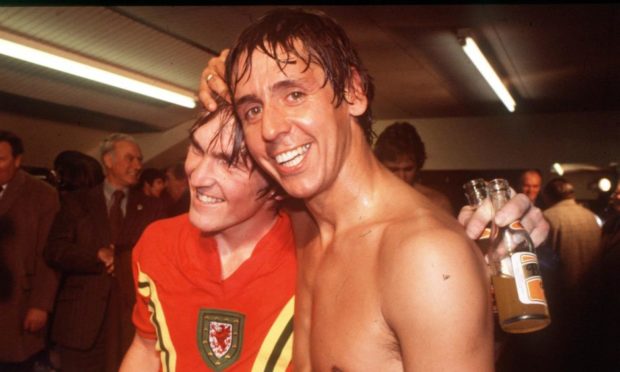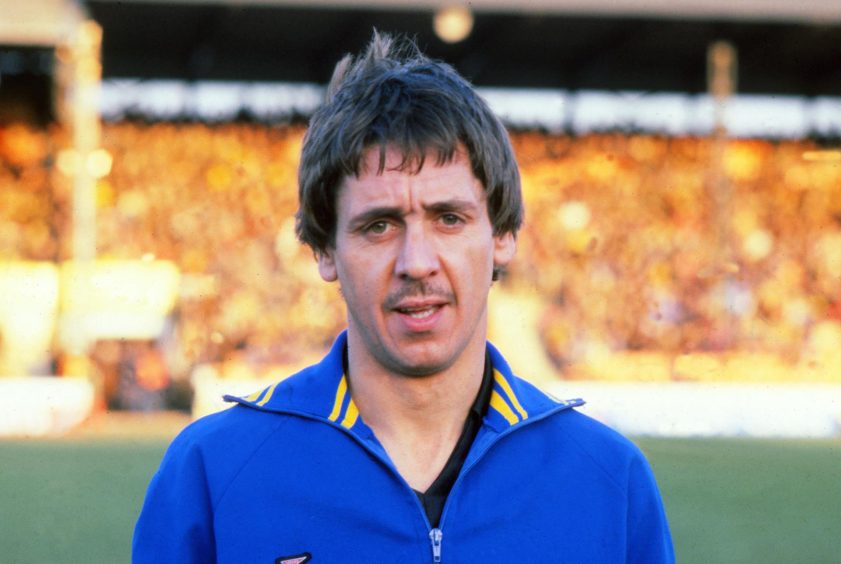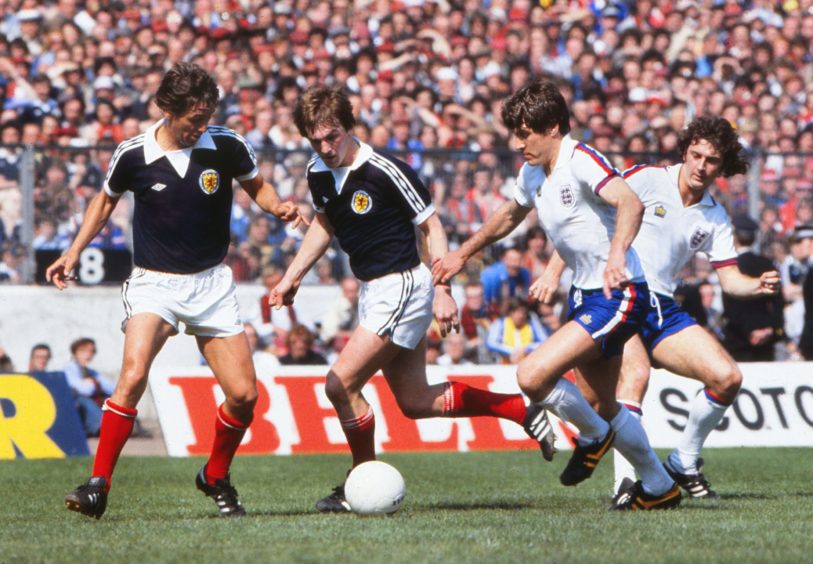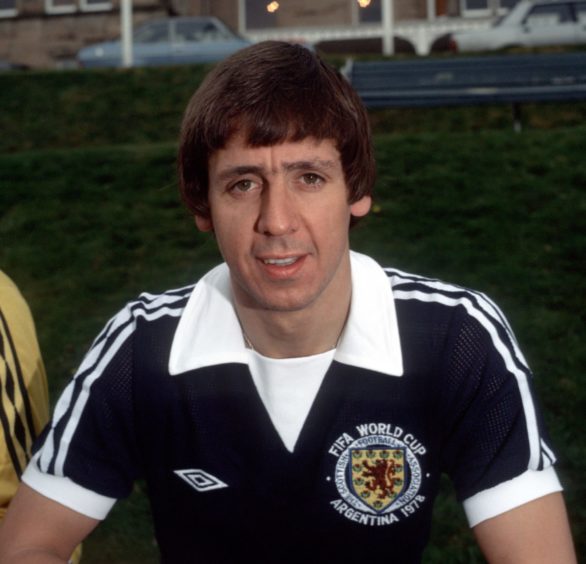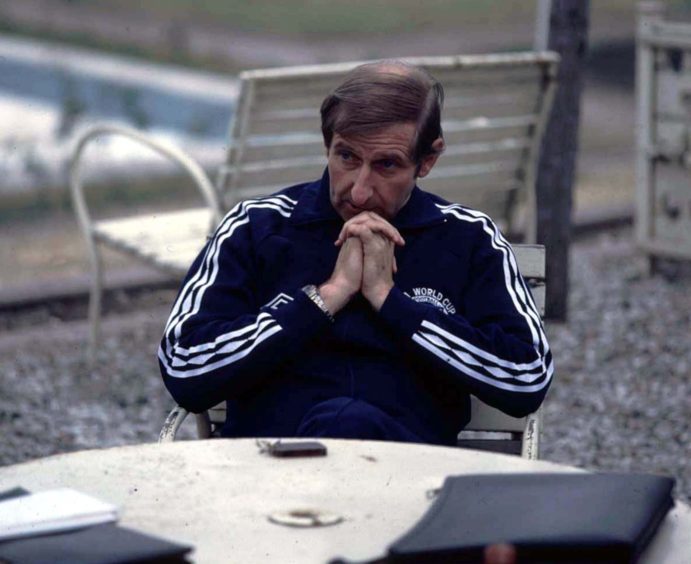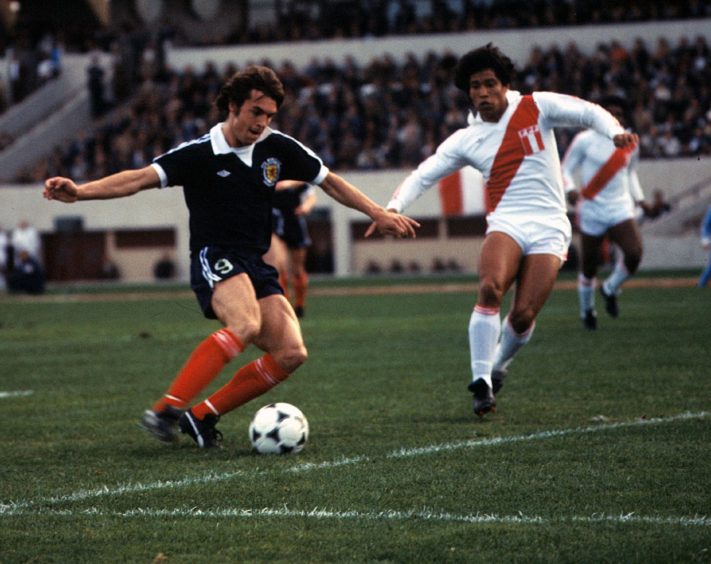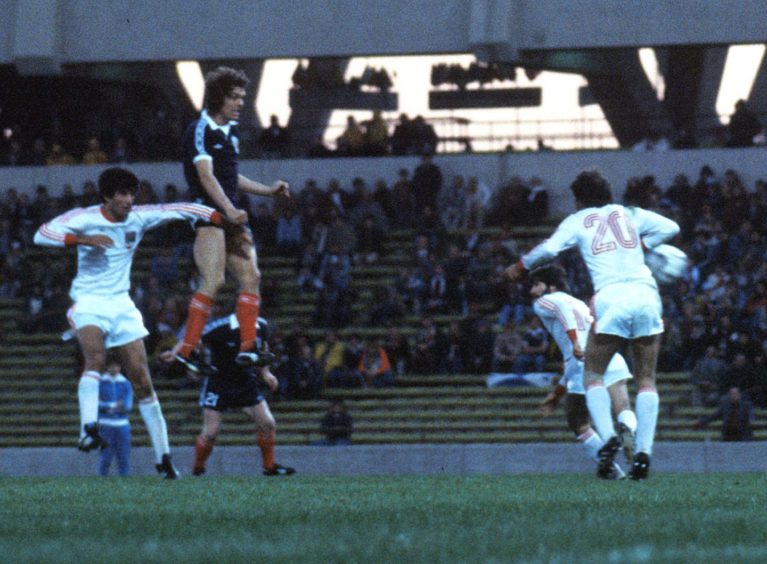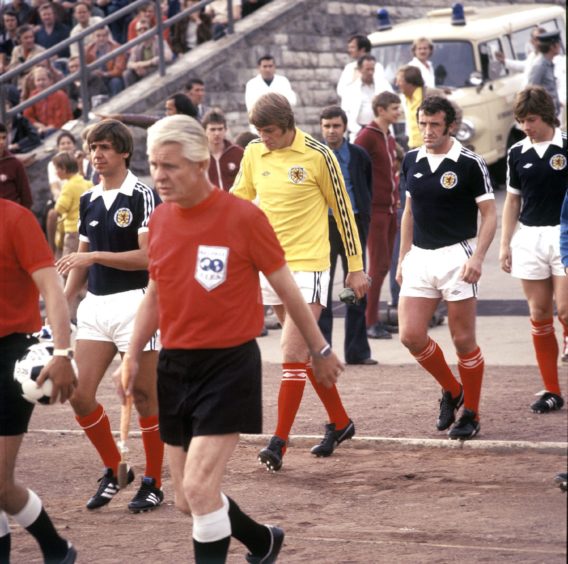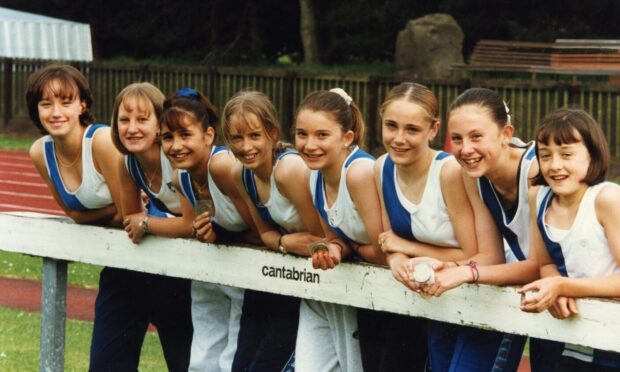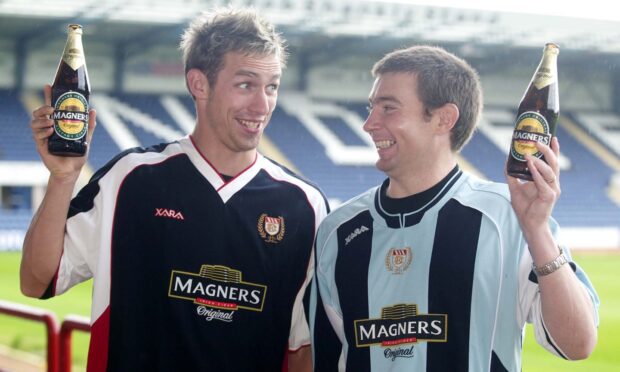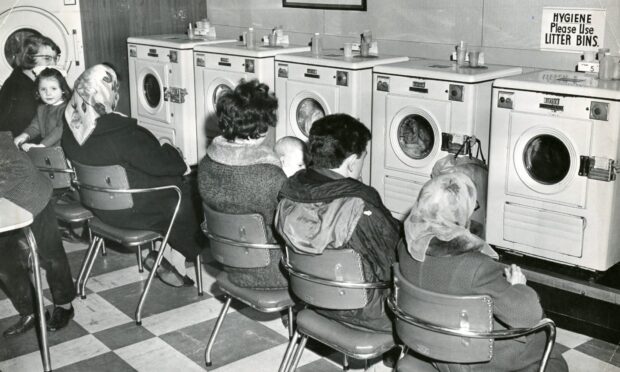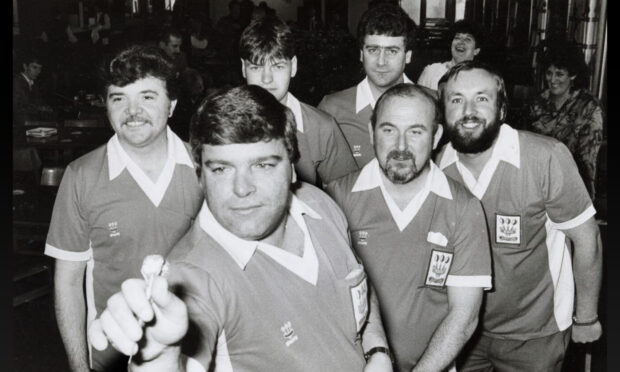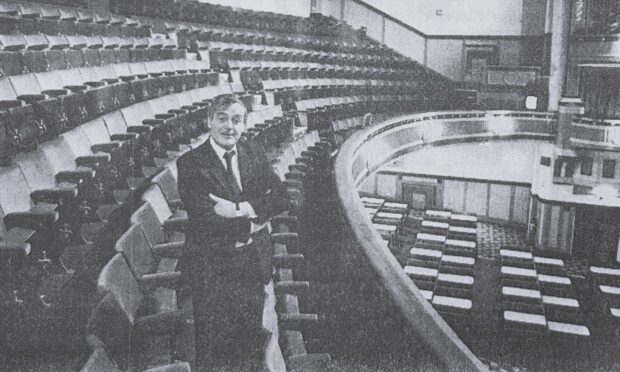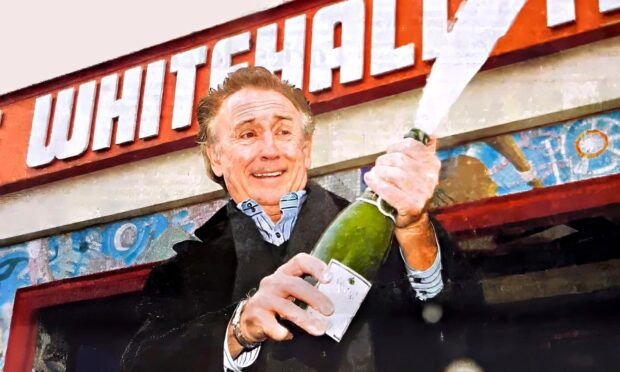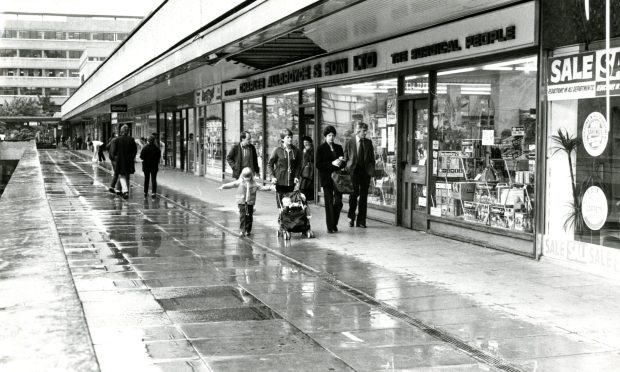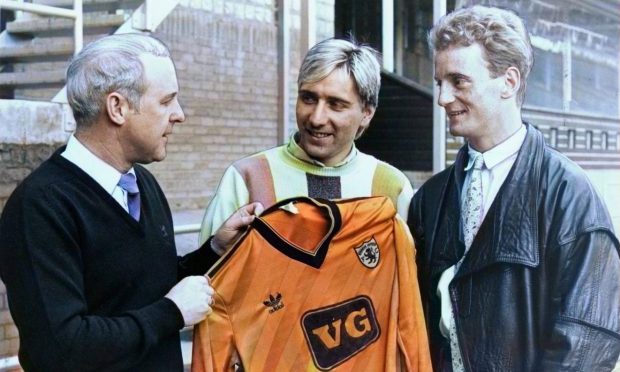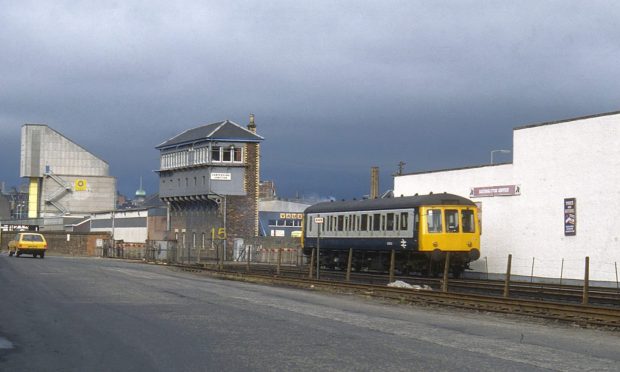Don Masson has spent the past 42 years apologising for breaking the hearts of a nation at the 1978 World Cup finals in Argentina.
Born in a bothy in the wilds of Aberdeenshire, Masson grew up in Banchory dreaming of playing for Aberdeen but his penalty miss against Peru became the stuff of nightmares and he never played for his country again.
Now 74, the former midfield maestro has been persuaded to write the story of his life including the tragic loss of his first wife Margaret which put Scotland’s doomed World Cup campaign firmly into perspective.
Banchory
Masson said he wasn’t a nice person during his playing days and the brutally honest autobiography deals full on with what he describes as the “horrible” side of his character which began to manifest itself after he left Banchory in 1958.
Masson always wanted to be a footballer and became captain of Banchory Academy’s under-12 side and also represented Kincardineshire after growing up kicking a tennis ball up against a wall.
“My dad used to take me to watch Aberdeen play and my idols at that time were Paddy Buckley and Graeme Leggat,” said Masson.
“Aberdeen won the league in 1955 and my dream was to play for the Dons and that’s all I wanted to do when I was growing up.
“I spent my career in England and I did play for Notts County against Morton and Kilmarnock in the Anglo-Scottish Cup in 1980 but one of my biggest regrets was never having played at Pittodrie.”
Masson moved to Middlesbrough when he was 12 which he said “could just as easily have been Australia”.
He said his personality changed when he moved to England but on the football front he felt very comfortable.
Middlesbrough
Middlesbrough signed him after he impressed for the school team and he made his debut in 1964 at the age of 18 against Charlton.
Notts County were 91st in the Football League when Masson joined from Middlesbrough in 1968 where he made history with the Magpies as the first player ever to captain the same club to three promotions during his two eventful spells at Meadow Lane.
He joined QPR in 1974 and was part of the team which almost won the league in 1976 where the blue and white hoops became the nation’s favourite underdogs and finished second to Liverpool by a point.
“Liverpool won everything in those days but they would be the first to acknowledge that for that one season under Dave Sexton we played football that was unbelievable,” he said.
“To be part of that was fantastic and I proved I could play at that level which is all I wanted to do.”
Masson won the first of his 17 Scotland caps against Wales in 1976 during his time at Loftus Road.
He scored the first goal in the 2-1 victory over England that same year which clinched Scotland’s first British Home International Championship since 1967.
“I think if I’d played in Scotland there’s no doubt in my mind I would have won more caps for Scotland,” said Masson.
“I was playing in the Second Division with Notts County and the manager Jimmy Sirrel kept recommending me to Willie Ormond ahead of the 1974 World Cup but because I was playing at a lower level I didn’t get a chance.
“I wasn’t playing any better than I was for Notts County when I went to QPR and got capped but it was a higher profile.
“It was good for Jimmy when I did get capped because he always championing my cause and was a father figure for me.”
Masson became the toast of Scotland when he converted a penalty which spurred Ally MacLeod’s team to the 2-0 victory over Wales at Anfield by which they qualified for the World Cup finals in 1978 and were Britain’s sole representatives in Argentina.
With a squad containing names such as Kenny Dalglish, Archie Gemmill, Graeme Souness and Joe Jordan, Scotland were given a rousing open-top bus send-off at Hampden Park and the supporters thought they were going to fly back with the World Cup on the plane.
Hype
Men, women and children believed as the nation lost its grip on reality and succumbed to the hype.
Masson insists the players did not get caught up in the fevered excitement.
“Playing for Scotland was a dream come true because every Scottish boy wants to play for Scotland,” said Masson.
“For such a small nation, even just to qualify for a major tournament was an achievement and none of the players got caught up in the hype.
“We went round Hampden in an open-top bus which was an absolute joke.
“Scotland are going to win the World Cup?
“The players were just privileged to have been able to qualify.”
The squad flew out to Argentina and were staying in the Sierras Hotel in Alta Gracia before the first group match against Peru in Cordoba where there was no carpeting in the players’ rooms and no water in the swimming pool.
“The set up in Argentina was an absolute joke and the players were practically confined to their rooms,” said Masson.
“We were surrounded by armed guards and couldn’t go out.
“There were just no facilities to relax in and nobody in those days gave a second thought to the players.
“The training ground was an absolute shambles.
“It was hardly the ideal preparation for the World Cup.”
Masson started in midfield alongside Bruce Rioch and Asa Hartford and things started well for Ally MacLeod and his team when Joe Jordan put Scotland ahead after 14 minutes before Cesar Cueto equalised just before half-time for Peru.
A foul on Bruce Rioch in the box gave Scotland a penalty on 60 minutes.
Spot kick
Masson took the spot kick but Peru goalkeeper Ramon Quiroga, who was aptly nicknamed El Loco, made a comfortable save to his right.
Teofilo Cubillas was outstanding and scored twice to give Peru a 3–1 win.
The Scots were under pressure and the SFA stumbled into one controversy after another.
Winger Willie Johnston failed a drugs test and then details were leaked of dressing-room rows over bonus payments.
Scotland had an immediate opportunity to redeem themselves against the group minnows Iran.
Masson and Rioch were replaced by Archie Gemmill and Lou Macari for a 1-1 draw which was depicted as a national disgrace.
Scotland eventually went out on goal difference despite a 3-2 win against Holland in the final match and Masson took aim at the SFA’s junketeers in a critical newspaper article and received a sine die ban.
He never played for Scotland again.
“There were six players vying for the midfield positions and I don’t think Scotland had ever had so much quality in the middle of the park and for me to even be in that six that went to Argentina was unbelievable,” said Masson.
“I was playing and Graeme Souness was my understudy which is crazy when you think about it in the cold light of day.
“I’ve always said that if I scored the penalty we would have gone on to qualify from the group.
“I’ll never say a bad word about Ally.
“He treated me so well and I let him down and I let the nation down.
“That was my last game for Scotland.
“I was the villain of the piece and quite rightly so.
“If you miss a penalty in the World Cup you are going to be blamed and I accept that.”
Playing for Uncle Sam
Masson returned to Notts County after the disappointment of Argentina and played for a time in Hong Kong and America.
He played for the Minnesota Kicks, a team that belonged to Jack Dunnett, who also owned Notts County, and the idea was he would play there for two years then come back and become coach and then manager at Notts County.
As it happened the team in America went bust so Jack got him the manager’s job at non-league Kettering Town so he could learn the ropes, then Notts County changed their owner so his chance went.
Masson said he only ever wanted to manage Notts County so he walked away from football.
He was trying to take his career in a new direction when wife Margaret died of a brain aneurysm in April 1986.
The bottom fell out of his world and he sought comfort in religion.
His life was changed but he got a second chance with his second wife Brenda.
Now the only baggage he carries is from his guests at the couple’s boutique B&B in Nottinghamshire.
“When I agreed to do the book I wanted to tell the whole story – no holds barred,” he said.
“It’s been therapeutic to get this off my chest.”
